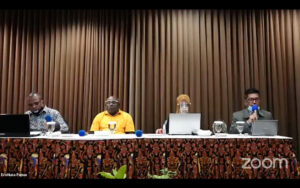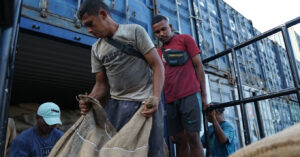
A total of 14 women gathered at the Mibi Learning Center in Mibi Village, Sorong, Southwest Papua on September 25-27, 2023. These women, who traveled from Sorong, South Sorong, Raja Ampat, and South Manokwari, received legal training from public lawyer and environmental activist, Nur Amalia.
This legal training was designed for women due to their limited role in the Papua community, such as in decision-making and policy determination. This training aims to empower women and encourage them to play a more active role in society. The participants represented a diverse range of backgrounds, including indigenous women leaders, arts and culture activists, women from government positions and political observers, as well as housewives concerned with issues related to law, justice, and the environment.
Over the course of three days, these women were facilitated to learn about various topics, such as the women’s roles, the importance of women’s involvement as paralegals, basic laws applicable in Indonesia, advocacy systems, the legal system, and the handling of cases related to indigenous communities and natural resources.
Read Also: A Travel Note: The Ireres Tribe Unites to Protect Indigenous Territories
To enhance their understanding, the participants were also asked to provide examples of various legal conflicts that are common and ongoing in their respective villages. They were encouraged to do mapping on the status of potential resources in their communities and review the efforts and solutions that have been implemented. During each session, the participants and mentors were engaged in role-playing activities to gain a deep dive understanding of legal practices.
This legal training was conducted due to the frequent occurrence of legal cases related to indigenous communities. For example, lawsuits were filed against the Regent of Sorong and the Regent of South Sorong in the Administrative Court after they revoked the palm oil plantation companies’ concession permits in their respective areas. The revocation of the permit followed an evaluation of palm oil licensing carried out by the West Papua Provincial Government in collaboration with the district government, civil society organizations, and national-level ministries and agencies, including the Corruption Eradication Commission in 2021. Some representatives of indigenous communities served as witnesses in the judicial process.
The experiences with permit evaluation and ongoing legal proceedings have taught them that the governance of permits needs to be monitored right from the beginning of the process, and it should not solely focus on government authorities but also involve indigenous communities. The community plays a significant role, from the pre-issuance phase to on-site monitoring and evaluation.
In general, the land of Papua is under threat from large-scale deforestation practices, and the presence of indigenous communities in their customary territories is also at risk of displacement. The vast expanse of Papua, the high level of threat, and limited legal resources present significant challenges that need to be addressed. With this legal training, women representatives in the land of Papua able to play a significant role in providing support to communities at the grassroots level, developing initial strategies to advocate for the interests of indigenous communities, offering assistance in case of conflicts, and supporting lawyers when cases arise at the indigenous community level or at higher levels.
All participants have agreed to become women paralegals in their respective communities. They will choose one or two cases at their villages that they consider important to be addressed, with the support from EcoNusa Foundation and legal organizations in their respective regions.
Since the beginning of the training, both participants and mentors have shown great enthusiasm. Sara Kristina Elluod from Raja Ampat expressed her excitement about this being her first legal training. It is rare for Papuan women to be given a specific platform for learning about the law because legal matters are sometimes considered taboo for women, with knowledge and understanding often being reserved for men.
Read Also: IRI: Interfaith Initiative Invites People to Defend the Forests
Ketsia Anance Rumander from South Manokwari also agreed. She recently learned that women can also study the law. With her newfound knowledge of the legal foundation through paralegal training, she feels more confident in advocating for the basic rights of indigenous communities, women, children, and the environment.
Furthermore, Yosephina Yarangga from South Manokwari hopes that she can help resolve legal issues or cases in her village. She was normally only able to observe and feel sympathy. With the knowledge she gained from the training, she now feels that she must be able to voice concerns and call out those responsible parties to be accountable for their actions.
She also hopes to inspire and work together with other women to ensure that women don’t remain silent when they see problems in their villages. They should collaborate to address issues, particularly in terms of the law because Papuan women should not be left in the dark about legal matters.
Editor: Nur Alfiyah, Swiny Adestika




